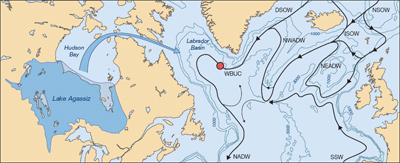Melting of Greenland ice sheet could alter warming trend
Melting of Greenland ice sheet could alter global warming trend
mongabay.com
December 6, 2007
Public sector has growing role in China’s forest management according to a new paper published in the journal Science
A massive release from freshwater from the glacial Lake Agassiz 8,200 years ago triggered dramatic cooling in the North Atlantic region, report researchers writing in Science. The sudden and intense cooling, which ended the stable climate that had characterized the Holocene warm period, could have future implications for the melting of Greenland’s ice sheet.

Map of study area with the location of core MD03-2665 (57º26.56N, 48º36.60W; 3440 m water depth) marked with a red circle. The black arrows indicate the overflows and spreading pathways of deep and intermediate currents modified. Total area covered by lake Agassiz is shaded and the general routing of the overflow and outburst through the Hudson bay to the North Atlantic is marked with a blue arrow. Courtesy of Science. |
Analyzing an ocean sediment core from the Northwest Atlantic, Helga Flesche Kleiven of the University of Bergen and colleagues found evidence to support the theory that the “catastrophic freshwater outburst” from Lake Agassiz was responsible for the rapid changes in ocean chemistry and currents in the North Atlantic.
The researchers say their work may be useful in predicting how climate may change in the future due to shifts in North Atlantic deep circulation. They warn that rapid melting of the Greenland ice sheet could trigger similar changes in the region.
“Despite the complex nature of the climate record, the fact that large scale changes in deep ocean circulation are accomplished just as quickly in the natural world as is predicted in computer simulations… confirms that they were sufficiently rapid to be a plausible mechanism for driving the similarly abrupt changes seen in paleoclimate records,” write the authors. “This observation helps to define the minimum timescale for altering ocean circulation and demonstrates that it is rapid enough to be relevant for human societies.
“The fact that these past ocean circulation changes are associated with the largest climate variations in the past underscores the importance of understanding the minimum
freshwater forcing capable of affecting such large circulation changes—particularly given the concerns about the impact of future warming on the Greenland ice sheet,” they conclude.
CITATION: Kleiven, H.F. et al (2007). “Reduced North Atlantic Deep Water Coeval with the Glacial Lake Agassiz Fresh Water Outburst.” Science, December 7, 2007